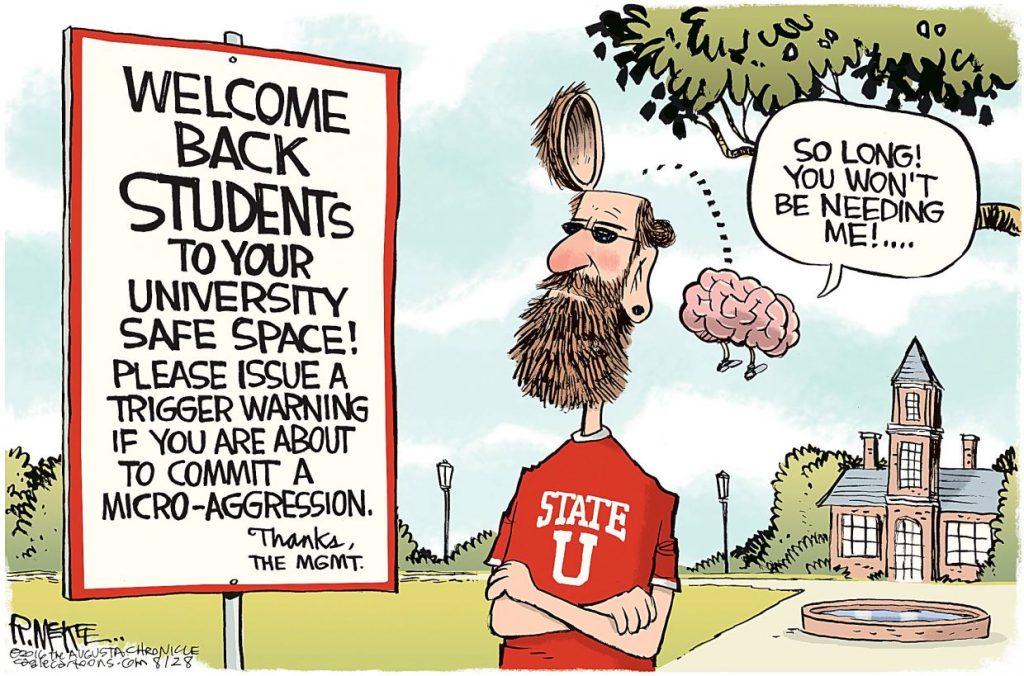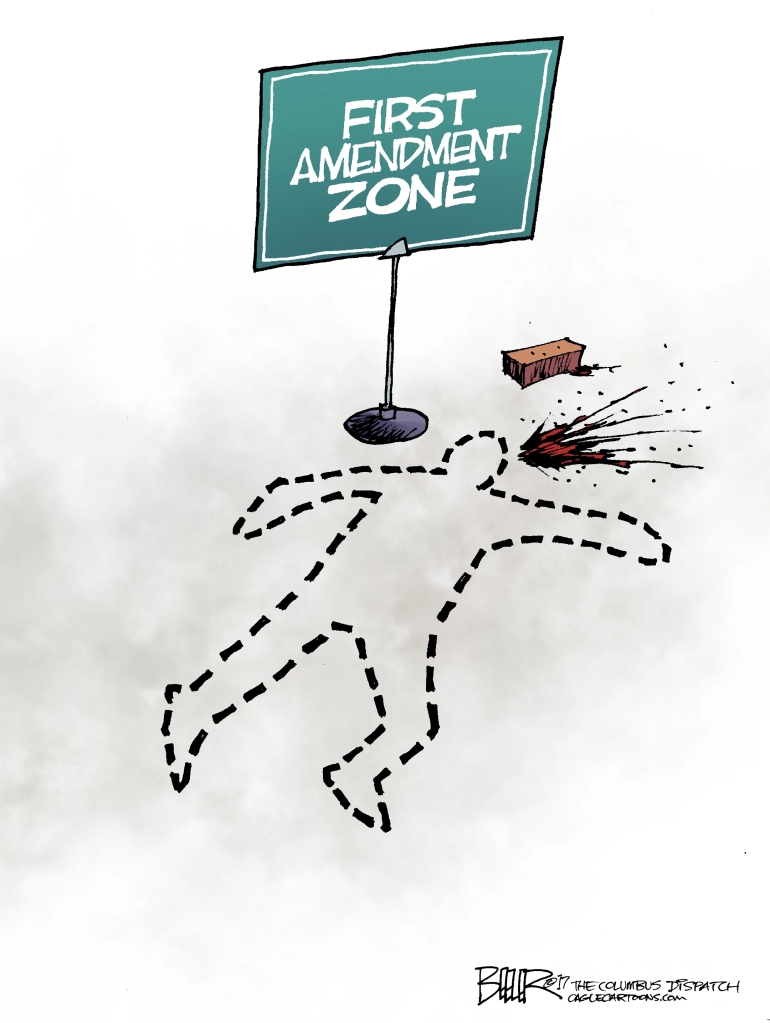“The smart way to keep people passive and obedient is to strictly limit the spectrum of acceptable opinion, but allow very lively debate within that spectrum. That gives people the sense that there’s free thinking going on, while all the time the presuppositions of the system are being reinforced by the limits put on the range of the debate.” —Noam Chomsky
Narrowing the range of acceptable opinion and debate (beyond what is needed for the protection of the dialectic) is a crucial feature of the system of cognitive control that lies at the heart of the system of domination. We see this with religious systems, where thought that lies outside the doctrinal parameters is punished as blasphemy and heresy. But we also see this thought-control tactic in today’s public university, where speech that lies outside the doctrinal parameters of DEI is punished as “Islamophobic,” “transphobic,” and other secular euphemisms for blasphemy and heresy.
This is the problem with the progressive conception of inclusion that lies at the heart of DEI programming: any ideological system that promotes itself as a desirable and comfortable space for those it clamors to include (this for the purpose of establishing political hegemony) must at the same time be exclusive of those speech acts that are supposed to make the desired targets uncomfortable, a determination made by the commissar. Thus those who dissent from the doctrinal parameters must be disciplined or excluded in some fashion. We see this in the proliferation of safe spaces and affinity groups.

The rules of inclusion are okay for private clubs where affinity is protected by right to associational freedom. A mosque doesn’t have to allow infidels into the building. It may also sex-segregate its spaces based upon the terms of its doctrine. That’s religious liberty. It is not however okay for public spaces or private spaces that provide public accommodation to practice inclusion based upon ideological prescription or proscription. These spaces must remain open to all individuals regardless of their opinions.
A private club for lesbians may exclude men. This is the same right as a church that precludes women from the role of cleric or that refuses to marry same-sex couples. This does not prevent anyone from criticizing these practices; however, the freedom of association permits individuals to make private spaces based on affinity and set the rules of those spaces. However, a club open to the public, i.e., an establishment of public accommodations, cannot impose such rules, as these would constitute civil rights violations. The only basis upon which public accommodations can be segregated are biological ones, such as exclusion based on age and sex—rationally justified, of course.
One of the reasons this is proving so difficult for so many people to understand is the decades-long socialization of an ideologically determined conception of diversity, the result of the effectively exclusive control over public spaces enjoyed by progressives. Progressive ideology is antithetical to the liberalism that established the free republic. The irony is not lost on me that liberal tolerance for diversity of opinion is part of the reason progressive ideology could have this effect; however, liberals have done a poor job in defending the principles of a free society. Part of the trick played by progressives involved conflating progressivism and liberalism (a similar trick has been played with the acronym LGBT), but that is no reason to fight against the tyranny of narrowing the range of acceptable opinion.
For progressives, who articulate a type corporatist philosophy, diversity in public spaces is achieved when a space includes representatives of the various tribes that exist on the grounds of gender, race, or other categories—real or invented. According to rules established by superficial pluralism, progressives determine which tribes are recognized, as well as the rules of who counts as tribal members. (For example, Dylan Mulvaney, a man who says he is a woman, can be woman, whereas Rachel Doleful, a white woman who says she is black, cannot be a black woman.)

In contrast to progressives, liberals understand diversity in terms of freedom of opinion, with public spaces, including those private places of public accommodations, existing as spaces that foster the maximization of the heterogeneity of thought by eschewing—indeed by outlawing ideological parameters. Liberals do not engage in the reductive act of seeing people as tribal representatives but rather treat individuals as existing under a singular rule of law and judged by ethical rules that exist universally. Neutrality in public spaces is necessary for the free exercise of our fundamental rights.
If there is an emergent tribal diversity in a public space, the liberal, the true pluralist, tolerates this, of course; at the same time, it must be acknowledged, that, if diversity of opinion is prioritized, then there is a risk that some individuals will avoid those spaces because they find the opinions expressed there disagreeable or offensive.
To be sure, this is the problem of the avoidant; the intolerant are wont to avoid spaces where their intolerance cannot be imposed on others. However, this risk is not merely an acceptable one—it’s the reason free spaces exist; those who do not wish to hear opinions with which they disagree or find offensive don’t have to enter those spaces. They have no right to impose their sensitivities on others, but rather enjoy the right to remove themselves from the presence of disagreeable or offensive speech.
This is sometimes posed as a dilemma, as if there are competing rights to speak freely and not hear objectionable things. But there is no right to be free from objectionable utterances if they are not harassing or intimidating, which are to be determined objectively not subjectively. Everybody has a choice to tolerate opinions they find disagreeable or offensive. If you are offended by something somebody says, that it is your responsibility.
For a liberal, a safe space is a space where any opinion can be safety expressed. This is essence of the free speech right. When I cannot be disciplined or punished for my utterances, then I enjoy a safe space. For progressives, a safe space is a space in which the range of opinion is constrained. Utterances that stray beyond the parameters of acceptable opinion are disciplined or punished. For the liberal, such spaces are unsafe spaces. Indeed, such spaces are potentially unsafe spaces for anybody depending on what speech parameters are emplaced.
Finally, the progressive conception of speech is a license for violence. If an utterance is offensive, and one has a right to be safe from offensive utterances, those who insist on making offensive speech threaten the safety of those who are offended by their utterances. In defending one’s safety, extreme measures are justifiable, including the resort to physical violence. We see this in such slogans “Speech is violence” and “Punch a TERF.”
Where can those who mean to punish people who make such utterances find their prey? In the First Amendment Zone. But remember, comrades, you also have a right to self-defense. You, too, can get physical.

